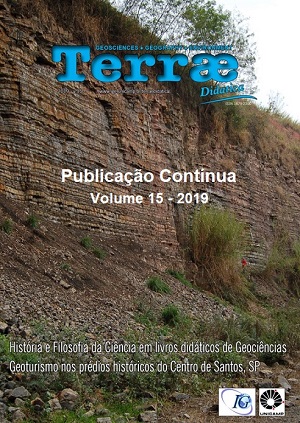Abstract
[Traslation from: Peppoloni S. and Di Capua G. (2012). Geoethics and geological culture: awareness, responsibility and challenges. Annals of Geophysics, 55, 3, 335-341, doi: 10.4401/ag-6099. Translated by Renata Augusta Azevedo, UFMG]
The international debate in the field of geoethics focuses on some of the most important environmental emergencies, while highlighting the great responsibilities of geoscientists, whatever field they work in, and the important social, cultural and economic repercussions that their choices can have on society. The Geoitalia 2009 and 2011 conferences that were held in Rimini and Turin, respectively, and were organized by the Italian Federation of Earth Science, were two important moments for the promotion of geoethics in Italy. They were devoted to the highlighting of how, and with what tools and contents, can the geosciences contribute to the cultural renewal of society. They also covered the active roles of geoscientists in the dissemination of scientific information, contributing in this way to the correct construction of social knowledge. Geology is culture, and as such it can help to dispel misconceptions and cultural stereotypes that concern natural phenomena, disasters, resources, and land management. Geological culture consists of methods, goals, values, history, ways of thinking about nature, and specific sensitivity for approaching problems and their solutions. So geology has to fix referenced values, as indispensable prerequisites for geoethics. Together, geological culture and geoethics can strengthen the bond that joins people to their territory, and can help to find solutions and answers to some important challenges in the coming years regarding natural risks, resources, and climate change. Starting from these considerations, we stress the importance of establishing an ethical criterion for Earth scientists, to focus attention on the issue of the responsibility of geoscientists, and the need to more clearly define their scientific identity and the value of their specificities.
References
Di Capua G., Peppoloni S. 2009. Scientific information: problems and responsibilities. In: Proceedings of the Mining Pribram Symposium, International session on Geoethics, Pribram, Czech Republic. URL:
Heisenberg W. 1958. Physics and philosophy: the revolution in modern science. In: Harper & Brothers Publishers, 2003. Fisica e filosofia. Milano: Nuove Edizioni Tascabili. 206 pp.
Ippolito F. 1968. La natura e la storia, Milano: Vanni Scheiwiller.
Martínez-Frías J., González J.L., Rull Perez F. 2011. Geoethics and deontology: from fundamentals to applications in planetary protection, Episodes, 34 (4): 257-262.
Matteucci R., Gosso G., Peppoloni S., Piacente S., Wasowski J. 2012. A Hippocratic Oath for geologists? Annals of Geophysics, 55 (3), 365-369; doi:10.4401/ag5650.
Nemec V. 2005. Developing geoethics as a new discipline. URL: .
Panizza M. 1989. Beni geologici e cultura del paesaggio, In: Atti Convegno Internazionale Accademia Nazionale dei Lincei. June 26-28, Roma, 85-86.
Panizza M., Piacente S. 1991. Relationship between cultural resources and the natural environment. In: Proceedings of the European Symposium. Science, Technology and European Cultural Heritage, Bologna, June 13-16, 1989, Oxford, Butterworth-Heinemann, 787-793.
Panizza M., Piacente S. 2003. Geomorfologia culturale. Bologna, Pitagora Editrice.
Peppoloni S. 2007. The problem of the scientific knowledge and the authoritativeness of the Earth sciences. In: Geoitalia 2007, Sesto Forum Italiano di Scienze della Terra. Rimini, September 12-14, 2007, Epitome; doi: 10.1474/Epitome.02.1318.Geoitalia2007.
Peppoloni S. 2008. Riflessioni filosofiche sull’identità e l’autorevolezza delle Scienze della Terra, Geoitalia. Federazione Italiana di Scienze della Terra, 22, 3-6.
Peppoloni S. 2009. Reflection cues on the cultural and social responsibility of the geologist in the third millennium. In: IX International Conference “New Ideas in Earth Sciences”, 3rd vol., Russian State Geological Prospecting University, Moscow.
Peppoloni S. 2011. Che cosa significa “Geoetica”? Dentro le parole, il senso dell’attività del geologo, Geoitalia. Federazione Italiana di Scienze della Terra, 34, 12-13.
Peppoloni S. 2012a. Social aspects of the Earth sciences. Interview with Prof. Franco Ferrarotti, Annals of Geophysics, 55 (3), 347-348; doi:10.4401/ag-5632.
Peppoloni S. 2012b. Ethical and cultural value of the Earth sciences. Interview with Prof. Giulio Giorello, Annals of Geophysics, 55 (3), 343-346; doi: 10.4401/ag5755.
Piacente S. 1999. Sensibilità geologica e consenso sociale, Mem. Descr. Carta Geol. d’It., 54, 451-454.
Piacente S., Poli G., eds. 2003. La memoria della Terra, la terra della Memoria. Bologna: L’inchiostroblu Editore.
Varet J. 2007. Global approach to geoethics: a first attempt. In: Mining Pribram Symposium, International session on Geoethics (Pribram, Czech Republic), Abstract.

This work is licensed under a Creative Commons Attribution 4.0 International License.
Copyright (c) 2019 Terrae Didatica


